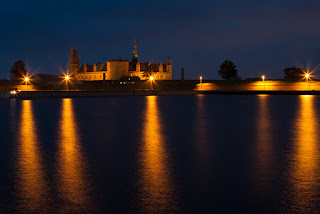Last September while I was in Sweden, my friend Lasse and I took the Stena Line ferry from Gothenburg, Sweden, to Frederikshavn, Denmark, a three-and-a-half-hour journey.
Even though I expected the ferry to be mere transportation, like the ferries I know in the Puget Sound, this one was more like the cruise ship I once took to the Caribbean. It had slot machines in all corners, playrooms for children, ping-pong and air hockey, an enormous duty-free shop, and a lounge for drinking and dancing. At this mid-September date, the large ship had so few passengers it felt cavernous, its many rooms and passageways relatively empty, its pleasures muted, its ping-pong tables quiet and air hockey sticks still.
But the weather was beautiful, and the ship was sailing into a clear blue sky over a glass-smooth blue-green sea in a bracing wind. The beautiful rock islands of Gothenburg’s archipelago slipped by. The coast of Sweden diminished and disappeared. After that, there was nothing to see from the deck but the enormous expanse of water, uniform and unvarying, an unending sameness of dark blue sea and its horizon-line meeting with the sky.
I could have stood at the railing for hours, staring not so much at the sea as at infinity itself – the emptiness, the nothingness, the foreverness, the mystery. Pre-Columbus sailors must have been afraid to sail far from shore not because they thought they would fall off the edge of the world but because they feared they would be sucked into eternity.
As I stood at the railing staring at the sea, a group of elderly people from a nursing home made their slow way onto the deck, bundled tightly in coats, hats, and mufflers, accompanied by attendants or family members, who wheeled them onto the deck in their wheelchairs or held their elbows as they shuffled against the wind or walked at their sides as they made hesitant, slow steps with their walkers. Wheelchairs were turned to face the sea and braked against the roll of the ship. Walkers were set aside as elderly bodies sank onto deck chairs. The point of the outing was pleasure of the crossing – the view from the deck, the amenities on the ferry, a chance to leave the nursing home, to be with family, to be outdoors. I didn’t want to stare at them, but I had the same impression I had looking at the sea: here, too, I was looking into infinity.
Downstairs we went into the cocktail lounge with its many small tables and end-of-the-season, one-guitar-plus-electronic-back-up dance band. Because the ferry ride makes a good inexpensive date, the lounge is usually full of young people or of families and older couples out for an excursion, but today only four or five elderly couples sat at the tables, only one or two gray-haired dancers swayed to the guitarist’s “Heartbreak Hotel."
A couple of days later, on the way back to Sweden, Lasse and I took the ferry from Helsingor, the town dominated by Kronborg, Hamlet’s castle. It was late at night when we boarded the ferry, and I watched the lights of Hamlet’s castle until they were swallowed by the dark.
Hamlet called death “the undiscover'd country from whose bourn/No traveller returns.” With those thoughts, with Hamlet, I was right back with the elderly couples dancing to “Heartbreak Hotel,” the old people shuffling with their walkers onto the deck, the infinitude of the sea itself.
Back in Gothenburg, I made a solitary excusion to the grave of my friend who had died the year before. Sadly I strewed on her grave the rose petals I had brought from home. I planted flowers on her grave, flowers she loved, watering them with my tears.
Downstairs we went into the cocktail lounge with its many small tables and end-of-the-season, one-guitar-plus-electronic-back-up dance band. Because the ferry ride makes a good inexpensive date, the lounge is usually full of young people or of families and older couples out for an excursion, but today only four or five elderly couples sat at the tables, only one or two gray-haired dancers swayed to the guitarist’s “Heartbreak Hotel."
A couple of days later, on the way back to Sweden, Lasse and I took the ferry from Helsingor, the town dominated by Kronborg, Hamlet’s castle. It was late at night when we boarded the ferry, and I watched the lights of Hamlet’s castle until they were swallowed by the dark.
Back in Gothenburg, I made a solitary excusion to the grave of my friend who had died the year before. Sadly I strewed on her grave the rose petals I had brought from home. I planted flowers on her grave, flowers she loved, watering them with my tears.
I miss her so much! Mixed with my grief is a misplaced anger. What is her name doing on that stone? Why is she not here, with me? But cancer wasn’t her fault. Her death wasn’t her idea. She was put on the ferry for the final crossing, while I am left here on shore to plant flowers on her grave and contemplate without understanding the infinity into which she has sailed.





We miss you Maren!
ReplyDelete